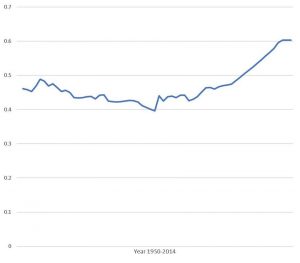'Quiet Quitting' is a wake up call but it is not the solution
In the past months, I have read several articles, I have gone through several social media posts or I have even held discussions with friends over this new concept that is now surrounding the world of work: ‘Quiet Quitting’. As per this Business Standard’s article published earlier this month: “Quiet quitting is often confused with quitting the job altogether. But it’s not. It is defined as performing only the jobs assigned to an employee by the employer and not going above and beyond the job description (it therefore does not involve quitting)”
I must say, initially, when I first heard about the concept, I felt somehow satisfied with its existence and even more, with the fact that workers around the world were joining this ‘Quiet Quitting trend’ in their workplace. I attributed my joy to an economic phenomenon that I feel is often overlooked in the public discourse: the global decline in the labour share of income since the 1980s. To explain in detail, ‘labour income’ is the amount that employed people earn by working (our salary, in other words). Economists use this term to distinguish it from capital income which refers to the owners of assets – land, machines, buildings, patents, shares – who earn income through those. Thus, capital income comes from capital, which is to say, comes from wealth itself, unlike labour income it does not come from any specific production or direct work.
Still, the connection between my support towards an initiative such as ‘Quiet Quitting’ and the downward trend in the labour share of income might require further explanation. Maybe, I should have mentioned above that a decline in labour share of income in the past decades has been paired, contrariwise, with an increase in the share of capital income. But still, what does this mean? Research has proven that there is a relationship between increasing dividend and interest payments and the decline of the share of wages. Those whose income comes from capital through the possession of wealth (rental income, assets, dividend income, machine…) have been gaining a bigger part of the pie, while wage earners (most of us) have been getting a smaller and smaller part of the pie.
The pie has become bigger to due to an increase in productivity which has occurred mainly due to the 2 following factors:
- The impact of technology – rapid progress in automation processes, digitalisation, telecommunication and information influxes.
- Global integration/globalisation – increase in global trade, participation in global value chains and an increase in foreign investment.

These two phenomena have been occurring within the framework of a deregulated model of financial capitalism. As the CFA Institute in this informative article mentions, while there is no fulcrum moment marking the start of financialization, we can point 1971 as a key year when world finance moved from a centralised to an uber-intermediated and less regulated model. This year, President Nixon announced that the US would unpeg the dollar from the golden standard – moving away from the Bretton Woods System
Let’s say this was the beginning of a financial orgy – mortgage-backed securities here, collateral debt obligations there, an exponential growth of over-the-counter and exchange-traded derivatives…). This finance fest imploded and ended drastically with what we know as the financial, economic and social crisis in 2007, but this is a topic for another day.
Let’s not beat around the bush and go back to the core of the matter. Since the 1970s in this ‘new’ era of financial capitalism, trade unions lost power vis-a-vis capital but also labour flexibility increased drastically. I think by now, I have had more jobs than my parents and grandparents in their entire life altogether – and I am just 27 🙁 . So what picture are we left with? While productivity is increasing due to exogenous and endogenous factors (technology, investment, globalisation…) at the same time, the labour market has become less regulated and the collective action of workers has been eroding since then.
Still, we have not reached the end of the argument. If productivity gains have been going majorly to capital rather than to salaried earners – capital being more concentrated in the upper ends of the income distribution –, this phenomenon has increased income inequality. Using the US as an example, the research done by Jacobson and Occhino in 2011, proved that the Gini index (used to measure income inequality) increased up to 0.33 percentage points for every percentage point decline in the labour share. According to these data, Jacobson and Occhino concluded that the decline that labour share had experienced since the early 1980s had translated into an increase of the Gini Index of up to 2.5 percentage points. In plain and relative words, owners of capital who tend to be the richest are getting richer, whereas the salaried workforce who tend not to be among the richest in a society, are getting poorer.
I took a bit longer to explain why part of me is in favour of this ‘Quiet Quitting’ practice. In a world with a trend towards an increase of capital income share but a decrease in labour income share, why should all the burden fall on workers? Why is it expected from us to go the extra mile in the workplace, while our salaries are not growing accordingly? In the past decades capital has squeezed workers.
Still, maybe ‘Quiet Quitting’ is not the best solution, even though it can be the beginning, an awakening for workers, and capital owners, to realise their situation. I feel that outlining possible solutions to overturn this trend and to bridge the income inequality gap, could be by itself an entire article (or many more).
However, ‘Quiet Quitting’ is an individual action where each worker decides to act on/protest individually due to the pressure and increased workload they experience. It is a practice where a worker refuses to go the extra mile or to do any task not specifically listed in the original job description. Anyhow, the reality is that most jobs can’t be entirely defined in a formal job description so organisations expect employees to step up to meet any incoming additional demand. So, a ‘Quite Quitting’ attitude might trump innovation in the workplace, stop businesses from creating and finding solutions that, in the end, might benefit us as a society too. The real challenge is how to decrease the burden and the frustration workers in the 21st century face while ensuring that innovation and progress are not hampered?

Well, first, when the pie increases let’s ensure that salaried workers get a fairer share of it. In practical terms, this means taxing capital progressively. As Thomas Piketty points out in his book ‘Capital in the Twenty-First Century’: “The right solution is a progressive annual tax on capital. This will make it possible to avoid an endless inegalitarian spiral while preserving competition and incentives for new instances of primitive accumulation.”
‘Quiet Quitting’ might be a wake up call for companies but individual action can only take you so far. Besides taxing capital, we need to remember that channelling frustration and demanding better conditions collectively can have an actual impact and transform the way we work for the better. In the end, I can vote and do many other things thanks to the successful collective action’s initiatives taken by citizens throughout the course of history.
I have shared, in this article, how ‘Quiet Quitting’ has taken me through a long train of thoughts leaving me with a sweet and sour taste, a kind of yes… but? I hope I ve been able to explain the reasons behind such ambivalence. I would like to end with a gente address towards educators – of any sort. Through history, education and in general the diffusion of knowledge and skills has been the most disruptive force to break with inequality.
By Celia Gueto Melo

Celia Gueto Melo is one of the two EDUREFORM Project Managers based in Chitkara University. She likes everything that has to do with human welfare. She believes everything is political in a way or another and she just wishes to understand how the world works.
References
Cho, T., S. Hwang and P. Schreyer (2017), “Has the Labour Share Declined?: It Depends”, OECD Statistics Working Papers, No. 2017/01, OECD Publishing, Paris, https://doi.org/10.1787/2dcfc715-en.
P. Dünhaupt (2017), Determinants of labour’s income share in the era of financialisation, Cambridge Journal of Economics, Volume 41, Issue 1, Pages 283–306, https://doi.org/10.1093/cje/bew023
ILO, IMF, OECD, World Bank. 2015. Income Inequality and Labour Income Share in G20 Countries: Trends, Impacts and Causes, Report prepared for the G20 Labour and Employment Ministers Meeting and Joint Meeting with the G20 Finance Ministers, Ankara, September.
Jacobson, Margaret & Occhino, Filippo. (2011). Labor’s Declining Share of Income and Rising Inequality. Economic Commentary (Federal Reserve Bank of Cleveland). 1-6. 10.26509/frbc-ec-201213







buy-backlinks.rozblog.com
I wanted to thank you for this very good read!! I absolutely loved every
little bit of it. I have got you saved as a favorite to check out new things you post…
my web page … buy-backlinks.rozblog.com
SEO marketing services at Phoenix marketing
Howdy! This post could not be written any better!
Going through this article reminds me of my
previous roommate! He continually kept talking about this.
I most certainly will send this post to him. Pretty sure he’s going to
have a good read. Thank you for sharing!
หวยออนไลน์
You are so awesome! I don’t think I’ve read through anything like this before.
So great to discover somebody with a few original thoughts on this topic.
Really.. thank you for starting this up.
This web site is something that’s needed
on the web, someone with a bit of originality!
pokiez casino app
Hello to every body, it’s my first pay a visit of this website;
this weblog includes awesome and genuinely excellent stuff designed for readers.
casin
Hurrah, that’s what I was exploring for, what a stuff!
present herre at tis web site, tjanks admin of this site.
mozillabd.science
This is very interesting, You’re a very skilled blogger. I have joined your feed and look forward to seeking more of your great post.
Also, I’ve shared your site in my social networks!
Review my web-site … Download Hip hop beats – mozillabd.science –
a fair go
This excellent website definitely has all of the information I needed concerning this subject and didn’t
know who to ask.
Vacation Ownership
I just couldn’t leave your website before suggesting that I extremely loved
the usual information a person supply for your guests.
mail.Inda-Car-Audio.tw
Thank you for sharing your thoughts. I really appreciate your efforts and I am waiting for your next post thank you once again.
Feel free to surf to my web blog; parents fighting
(mail.Inda-Car-Audio.tw)